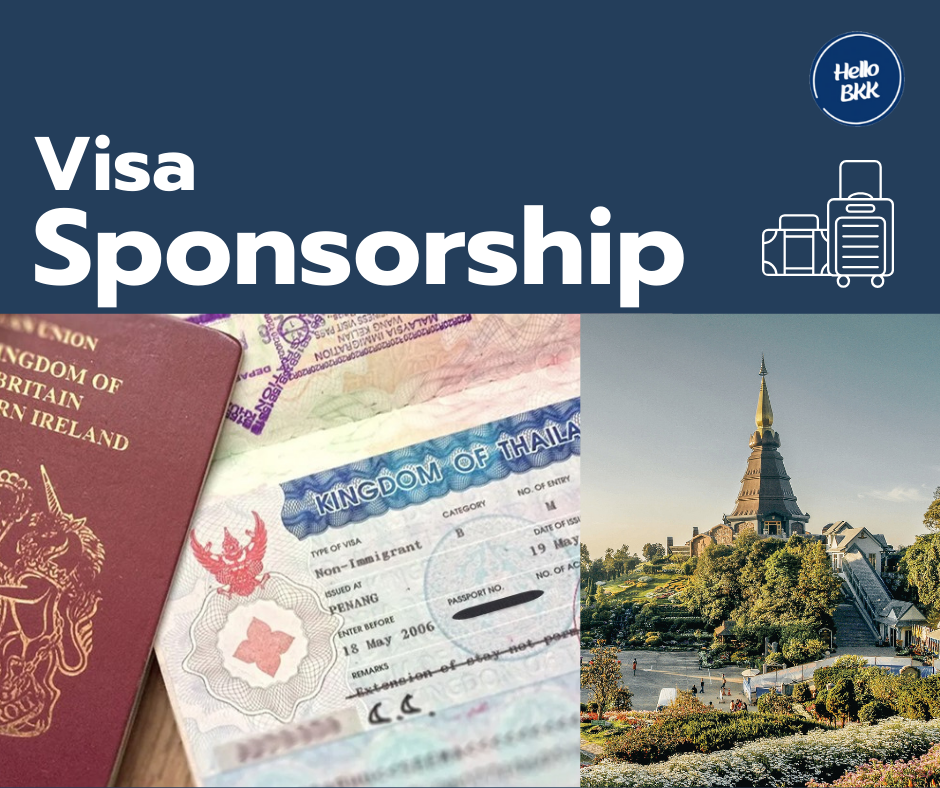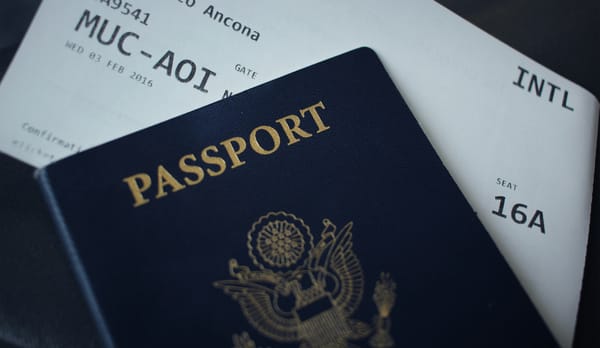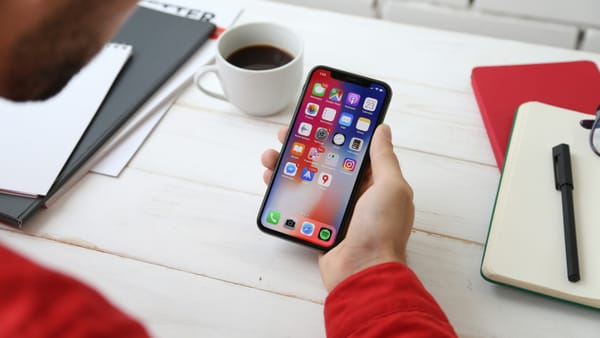ဗီဇာစပွန်ဆာ ပေးတယ်ဆိုတာ (ft. Non-B visa)

I often see questions about whether I got a job and the company wants to offer me a visa sponsored and they told me to study and bring it on myself. Firstly, I am happy for those who get visa sponsorship from the company. So, how does visa sponsorship work? Let's learn a little about what documents are required.
There are two types of work visas in Thailand, the Non-B Visa and the Non-LA Visa. As for non-LA visas, we already know the pink card, a general worker visa. The Non-B Visa is for jobs that require professional skills. When you say professional skills, it is easy to understand that it means jobs that require educational qualifications. Eg, Engineers (Civil, Mechanical, Electrical), IT, Consultants (Management, Financial), and doctors. A non-LA visa is also referred to as a blue-collar job, and a Non-B visa is also known as a white-collar job.
There is not much to say about non-LA visas. I wrote about it here: link. Let's focus on the Non-B visa.
When the company says that they will sponsor a visa, the first thing you need to check is which type of visa your job category is. If it's a non-LA visa type, there's not much to worry about because there are not many requirements for the employee or not much demand from the company. But the Non-B visa category is a bit confusing. Because 1) there is a requirement to be met by the employee. 2) There are also requirements to be followed by the company. Therefore, to provide non-B visa sponsorship, not only the employee's side but also the company's side must comply. Sometimes, there are things that the company itself does not know for sure.
There are two types of companies in Thailand: BOI-promoted and non-BOI-promoted companies. BOI (Board of Investment) is the incentive for Thai and foreign businesses. A government agency that promotes investment in the country by providing support and services. You can just keep in mind in short that if the company is a BOI-promoted company, you have privileges. Let's just remember that it is higher than the non-BOI promoted company. Why it is said to be high level is written below.
Ok, let's go back to the issue of sponsorship. The requirements that the employee must meet are:
- At least a university degree
- If you have a bachelor's degree, at least 3 years of relevant work experiences
- If you don't have a bachelor's degree, you need at least 5 years of relevant work experience
- Documents proving that work experience has been met (must be requested from the previous company)
It may vary slightly depending on the type of business you have, but basically, these are the essentials.
Other requirements that the company has to follow are:
- A visa sponsor must have a registered capital of at least 2 million baht
- A foreigner can only be appointed if (4) Thai employees are appointed
- Company registration form
- Tax-related documents
- There are roughly the payroll documents of the employees.
BOI-promoted companies do not need to show a minimum capital of 2 million baht. There is no restriction on a 4:1 ratio of Thai employees.
That is why it is said that the BOI-promoted company is high. Another thing is that BOI-promoted companies have a thorough understanding of the visa sponsorship process. I mean, if a BOI-promoted company provides sponsorship, there is no part for the employee to do. You just need to provide the necessary documents. The rest is done by the company. Most of the companies that requested their employee to study the visa sponsor process are non-BOI companies.
Proof of capital and the need to prove company documents can sometimes lead to non-BOI-promoted companies being afraid to offer visa sponsorship.
May it be ok...
ဗီဇာစပွန်ဆာ ပေးတယ်ဆိုတာ (ft. Non-B visa)
အလုပ်ရလို့ ကုမ္ပဏီဘက်က ဗီဇာစပွန်ဆာပေးမလို့ ကိုယ့်ဘာသာလာ လေ့လာဖို့ပြောလိုက်လို့ပါ ဆိုတဲ့ မေးခွန်းမျိုး မကြာမကြာ တွေ့ရတတ်ပါတယ်။ အဲ့သလို ကုမ္ပဏီဘက်က ဗီဇာစပွန်ဆာရတဲ့သူတွေအတွက် ဝမ်းသာပါတယ်။ ဆိုတော့ ဗီဇာစပွန်ဆာပေးတယ်ဆိုတာ ဘယ်လိုလဲ၊ ဘာစာရွက်စာတမ်းတွေလိုလဲ ဆိုတာတွေ နည်းနည်းလေ့လာ ကြည့်ရအောင်ပါ။
ထိုင်းနိုင်ငံမှာ Non-B Visa နဲ့ Non-LA Visa ဆိုပြီးတော့ အလုပ်လုပ်ခွင့် ဗီဇာ နှစ်မျိုးရှိပါတယ်။ Non-LA visa ကတော့ ကျနော်တို့ သိထားပြီးသား ဘတ်ရိုက်တာတို့၊ အခြေခံအလုပ်သမားတွေကို ပေးတဲ့ ဗီဇာပါ။ Non-B Visa ကတော့ အသက်မွေးဝမ်းကျောင်း အတတ်ပညာ လိုအပ်တဲ့ အလုပ်မျိုးကို ပေးတာပါ။ အသက်မွေးဝမ်းကျောင်း အတတ်ပညာလို့ ပြောတဲ့အခါမှာ တစ်နည်းအလွယ်မှတ်လို့ရတာက ပညာအရေးအချင်း ဘွဲ့လက်မှတ်တွေ လိုအပ်တဲ့အလုပ်မျိုး Eg. Engineer (Civil, Mechanical, Electrical), IT, Consultants (Management, Financial), ဆရာဝန်တို့ အကြမ်းအားဖြင့် ပါဝင်ပါတယ်။ Non-LA visa ကို blue collar job လို့ခေါ်သလို Non-B visa ကိုတော့ white collar job ဆိုပြီးလည်း ခေါ်ပါတယ်။
Non-LA visa အကြောင်းကိုတော့ အကျယ်ချဲ့ ပြောစရာမရှိပါဘူး။ ဘတ်ရိုက်တာနဲ့ ပါတ်ပြီး ဒီမှာရေးထားပါတယ် လင့်။ Non-B visa ကိုပဲ အဓိကထား လေ့လာရအောင်ပါ။
ကုမ္ပဏီဘက်က ဗီဇာစပွန်ဆာပေးမယ်လို့ ပြောတဲ့အခါမှာ ပထမဆုံး ပြန်စစ်ဆေးရမှာက ကိုယ်ရထားတဲ့ အလုပ်က ဘယ် ဗီဇာအမျိုးအစားကိုပေးတဲ့ လုပ်ငန်းလဲဆိုတာပါပဲ။ Non-LA visa အမျိုးအစားဆိုရင်တော့ အလုပ်ရှုပ်စရာ သိပ်မရှိပါဘူး။ ဝန်ထမ်းဘက်က လိုအပ်ချက်တို့၊ ကုမ္ပဏီဘက်က လိုအပ်ချက်တို့ သိပ်မရှိလို့ပါ။ ဒါပေမယ့် Non-B visa အမျိုးအစားမှာတော့ နည်းနည်းရှုပ်ပါတယ်။ ဘာလို့လဲဆိုတော့ ၁) ဝန်ထမ်းဘက်က ပြည့်မီရမည့် သတ်မှတ်ချက် ရှိပါတယ်။ ၂) ကုမ္ပဏီဘက်က လိုက်နာရမည့် သတ်မှတ်ချက် တွေလည်း ရှိပါတယ်။ ဆိုတော့ Non-B visa စပွန်ဆာ ပေးဖို့က ဝန်းထမ်းဘက်ကသာမက ကုမ္ပဏီဘက်ကပါ လိုက်နာရမှာတွေ ရှိပါတယ်။ တခါတခါ ကုမ္ပဏီကိုယ်တိုင် သေချာ မသိတာတွေလည်း ရှိပါတယ်။
ထိုင်းနိုင်ငံရှိ ကုမ္ပဏီတွေမှာ BOI စာရင်းဝင် နဲ့ BOI စာရင်းမဝင်ထားတဲ့ ကုမ္ပဏီဆိုပြီး နှစ်မျိုး ရှိပါတယ်။ BOI (Board of Investment) ဆိုတာကတော့ ထိုင်းနှင့်နိုင်ငံခြားစီးပွားရေးလုပ်ငန်းများကို မက်လုံးများ၊ ပံ့ပိုးမှုများနှင့် ဝန်ဆောင်မှုများပေးခြင်းဖြင့် နိုင်ငံတွင်း ရင်းနှီးမြှုပ်နှံမှုကို မြှင့်တင်ပေးသည့် အစိုးရအေဂျင်စီတစ်ခုပါ။ အလွယ်မှတ်ရရင် BOI စာရင်းဝင် ကမ္ပဏီဆိုရင် အခွင့်ထူးတွေ ရထားတယ်၊ စာရင်းမဝင်ထားတဲ့ ကမ္ပဏီထက် တဆင့်မြင့်တယ်လို့ပဲ မှတ်ထားလိုက်ကြရအောင်ပါ။ ဘာလို့ တဆင့်မြင့်တယ်လို့ ပြောရလဲဆိုတာ အောက်မှာ ရေးထားပါတယ်။
အိုကေ၊ စပွန်ဆာပေးတဲ့ ကိစ္စပြန်ပြောရအောင် ပထမလိုအပ်ချက်ဖြစ်တဲ့ ဝန်ထမ်းဘက်က ပြည့်မီရမည့် သတ်မှတ်ချက်တွေကတော့ -
- အနည်းဆုံး တက္ကသိုလ်ဘွဲ့လက်မှတ်
- ဘွဲ့လက်မှတ်ရှိရင် သက်ဆိုင်ရာ လုပ်ငန်းအတွေ့အကြုံ အနည်းဆုံး (၃) နှစ်
- ဘွဲ့လက်မှတ်မရှိရင် သက်ဆိုင်ရာ လုပ်ငန်းအတွေ့အကြုံ အနည်းဆုံး (၅) နှစ်
- လုပ်ငန်းအတွေ့အကြုံ ပြည့်မီကြောင်း သက်သေပြစာရွက်စာတမ်းများ (အရင်လုပ်ခဲ့တဲ့ ကုမ္ပဏီကနေ တောင်းရမှာပါ)
ကိုယ်ရထားတဲ့ လုပ်ငန်အမျိုးအစားပေါ် အနည်းငယ် ကွာခြားမှုရှိနိုင်ပေမယ့် အခြေခံအားဖြင့် ဒါတွေ လိုအပ်ပါတယ်။
နောက်တစ်ခုဖြစ်တဲ့ ကုမ္ပဏီဘက်က လိုက်နာရမည့် သတ်မှတ်ချက်တွေကတော့ -
- ဗီဇာစပွန်ဆာတစ်ယောက်အတွက် မှတ်ပုံတင်မတည်ရင်းနှီးငွေ အနည်းဆုံး ဘတ် ၂ သန်းရှိရပါမယ်
- ထိုင်းနိုင်ငံသားဝန်ထမ်း (၄)ဦး ခန့်ထားမှသာ နိုင်ငံခြားသားတစ်ယောက် ခန့်ထားနိုင်ပါမယ်
- ကုမ္ပဏီ မှတ်ပုံတင် စာရွက်
- အခွန်စာရွက်စာတမ်းများ
- ဝန်ထမ်းများရဲ့ payroll စာရွက်စာတမ်းများ ဆိုပြီးတော့ အကြမ်းအားဖြင့် ရှိပါတယ်။
BOI စာရင်းဝင်ထားတဲ့ ကုမ္ပဏီတွေကတော့ မတည်ရင်းနှီးငွေ အနည်းဆုံး ဘတ် (၂) သန်း ပြစရာမလိုပါဘူး။ ထိုင်းနိုင်ငံသားဝန်ထမ်း (၄)ဦးခန့်ထားမှသာ နိုင်ငံခြားသားတစ်ယောက် ခန့်ရမယ်ဆိုတဲ့ ကန့်သတ်ချက် မရှိပါဘူး။
အဲ့ဒါကြောင့် BOI စာရင်းဝင်ဆို တဆင့်မြင့်တယ်လို့ ပြောရတာပါ။ နောက်တစ်ခုက BOI စာရင်းဝင်ထားတဲ့ ကုမ္ပဏီတွေက ဗီဇာစပွန်ဆာပေးတဲ့ ဖြစ်စဥ်ကို သေချာလေး နားလည်ထားကြပါတယ်။ ပြောချင်တာ BOI စာရင်းဝင် ကုမ္ပဏီက စပွန်ဆာပေးမယ်ဆိုရင် ဝန်ထမ်းဘက်က လုပ်ရတဲ့အပိုင်း မရှိပါဘူး၊ လိုအပ်တဲ့ စာရွက်စာတမ်းတွေကို ပေးလိုက်ယုံပါပဲ။ ကျန်တာအားလုံး ကုမ္ပဏီဘက်က လုပ်ပေးပါတယ်။ အဲ့တော့ ဗီဇာစပွန်ဆာပေးမယ် ကိုယ့်ဘာသာ လေ့လာဆိုတဲ့ ကုမ္ပဏီအများစုကတော့ non-BOI တွေများပါတယ်။
မတည်ငွေ သက်သေပြရတာ၊ ကုမ္ပဏီစာရွက်စာတမ်းတွေကို သက်သေပြရတာတွေကြာင့် BOI စာရင်းမဝင်ထားတဲ့ ကုမ္ပဏီတော်တော်များများ ဗီဇာပေးဖို့ တွန့်ဆုတ်တတ်ကြပါတယ်။
အဆင်ပြေကြပါစေ...




